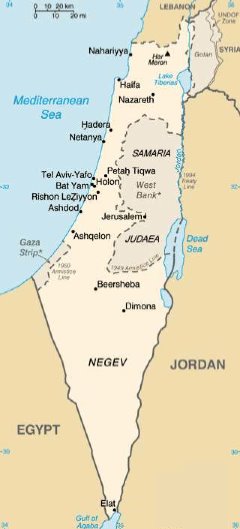Weekend News Wrapup- 7/22/07
Israel and the Palestinian Territories
PALESTINIAN Authority President Mahmoud Abbas has apparently made good on his pledge to crack down on Hamas in the West Bank. On Sunday his security services arrested 22 rival Hamas operatives in a 24-hour campaign against the terrorist group. This comes as members of terrorist groups associated with Abbas' Fatah party have pledged to end their attacks on Israel and turned in their weapons in return for being removed from Israel's wanted list. The question remains as to how many individuals have made that pledge, and whether Abbas is willing and able to enforce an end to attacks on Israel from his own party.
Syria
IRANIAN President Mahmoud Ahmadinejad met in Damascus this past week with Syrian President Bashar al-Assad and Hezbollah leader Hassan Nasrallah. Assad and Ahmadinejad reportedly struck a deal where Iran would fund for Syria $1 billion worth of advance weapons--including fighter jets, tanks, and missiles--and aid in Syrian nuclear and chemical weapons research. In return, Assad reportedly promised not to seek peace with Israel. Iran has denied the deal.
Turkey
EXIT Polls in Turkey's parliamentary elections show the religious-oriented Justice and Development Party [which goes by its Turkish initials "AKP"] won in a landslide against strictly secular parties. Preliminary polls give AKP 51.6%, while left-leaning Republican People's Party ["CHP"] won 15.2% and far-right National Action Party ["MHP"] won 13.7%.
The AKP is more accurately compared to the religious right in the U.S. rather than other "Islamist parties" such as Hamas in the Palestinian territories or Hezbollah in Lebanon. It is considered pro-business, and has overseen annual GDP growth of 7%. It also has worked to conform Turkish laws to fit European Union standards. But it wishes to permit more public expressions of religion in Turkey, such as allowing women to wear head-coverings in public universities or allowing politicians to publicly proclaim their faith. Kemal Ataturk, the founder of modern Turkey, imposed a strict separation of Mosque and State.
In recent months there has been tension between the current AKP government and the military, which considers itself the guardian of Turkish secularism. The military has initiated four coups since the 1960's; the latest occurred in 1997 when Prime Minister Necmettin Erbakan was pressured to step down due to his militant Islamist views. The AKP has much milder views than Erbakan, but the military has accused the party of undermining Turkey's secular character.
In Turkish elections, voters select parties rather than candidates. The party with the most votes wins the most seats in the 550 member parliament. A party must receive at least 10% of the vote to gain seats. If a party takes more than 50% of the seats, they form the government; if no party receives an absolute majority of the seats, several parties may form a coalition government.



0 comments:
Post a Comment